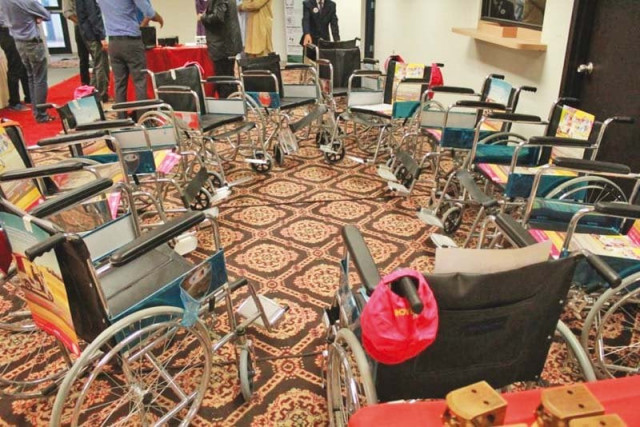Mobility for everyone: Need for accessible public transport stressed
For people with disabilities, commuting in Karachi is a near-impossible task

NOWPDP organised a session in collaboration with ‘I Am Karachi’ to highlight the issue of lack of public transport facilities for people with disabilities. PHOTO: COURTESY NOWPDP
In a city where using public transport is a nightmare for everyone, commuters with disabilities have an even tougher time. While the old, rusty minibuses briefly come to a halt for women to embark and slow down a little for men to jump off, they often simply ignore passengers with disabilities.
The Network of Organisations Working with People with Disabilities, Pakistan (NOWPDP), held a session in collaboration with 'I Am Karachi' to highlight this issue, which limits mobility and, therefore, progress. The network, an initiative of the Aga Khan National Council, aims to create an inclusive society that upholds the rights of people with disabilities.

"We can have large, inclusive schools and inclusive hospitals but if someone cannot reach them, they are useless," pointed out development professional Reem Khan, addressing a small group of people who had gathered to celebrate the start of NOWPDP's campaign 'Mainstreaming People with Disabilities', which focuses on accessible transport in Karachi.
Seeking mobility for everyone, Khan urged communities to come together to resolve issues that hinder growth. "Questions about access and barriers to access are something we all must ask."
As the participants discussed the problems with public transport in the metropolis, Amin Andani, the head of NOWPDP's The Rickshaw Project, shared a story about his physically challenged colleague. "I asked Imran bhai how he would commute if he did not have his customised three-wheeler," he narrated. "He replied that he wouldn't be coming to work. His skills would have remained buried in Baldia if he could not travel with ease."
While having facilities for people with disabilities is crucial, Andani also stressed the need for changing attitudes. "A disability will not go away when people are considerate but the feeling of being disabled might," he pointed out.
What is common in Pakistan, however, is an attitude of helping people with disabilities, rather than letting them help themselves. Ramiz Baig, the honorary secretary of the Institute of Architects, Pakistan, recalled when his firm, as part of NOWPDP's Yaqeen project, began to assess buildings in Karachi for accessibility. "We came across a worker at Karachi Cantonment Station who, in reply to a question about ramps, said, 'Forget about ramps, we have six people who can carry anyone.'"
Emphasising the need to end dependence, Baig pointed out, "We don't have to work for them - we have to work with them."
Published in The Express Tribune, June 13th, 2015.



















COMMENTS
Comments are moderated and generally will be posted if they are on-topic and not abusive.
For more information, please see our Comments FAQ